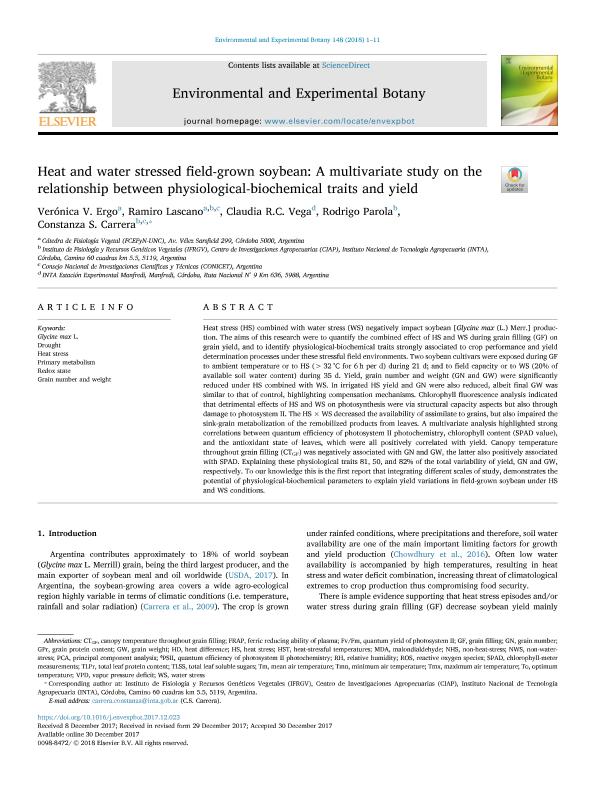Mostrar el registro sencillo del ítem
dc.contributor.author
Ergo, Verónica Vanesa

dc.contributor.author
Lascano, Hernan Ramiro

dc.contributor.author
Vega, Claudia Rosa Cecilia

dc.contributor.author
Parola, Rodrigo

dc.contributor.author
Carrera, Constanza Soledad

dc.date.available
2018-12-11T18:08:17Z
dc.date.issued
2018-04
dc.identifier.citation
Ergo, Verónica Vanesa; Lascano, Hernan Ramiro; Vega, Claudia Rosa Cecilia; Parola, Rodrigo; Carrera, Constanza Soledad; Heat and water stressed field-grown soybean: A multivariate study on the relationship between physiological-biochemical traits and yield; Pergamon-Elsevier Science Ltd; Environmental and Experimental Botany; 148; 4-2018; 1-11
dc.identifier.issn
0098-8472
dc.identifier.uri
http://hdl.handle.net/11336/66257
dc.description.abstract
Heat stress (HS) combined with water stress (WS) negatively impact soybean [Glycine max (L.) Merr.] production. The aims of this research were to quantify the combined effect of HS and WS during grain filling (GF) on grain yield, and to identify physiological-biochemical traits strongly associated to crop performance and yield determination processes under these stressful field environments. Two soybean cultivars were exposed during GF to ambient temperature or to HS (>32 °C for 6 h per d) during 21 d; and to field capacity or to WS (20% of available soil water content) during 35 d. Yield, grain number and weight (GN and GW) were significantly reduced under HS combined with WS. In irrigated HS yield and GN were also reduced, albeit final GW was similar to that of control, highlighting compensation mechanisms. Chlorophyll fluorescence analysis indicated that detrimental effects of HS and WS on photosynthesis were via structural capacity aspects but also through damage to photosystem II. The HS × WS decreased the availability of assimilate to grains, but also impaired the sink-grain metabolization of the remobilized products from leaves. A multivariate analysis highlighted strong correlations between quantum efficiency of photosystem II photochemistry, chlorophyll content (SPAD value), and the antioxidant state of leaves, which were all positively correlated with yield. Canopy temperature throughout grain filling (CTGF) was negatively associated with GN and GW, the latter also positively associated with SPAD. Explaining these physiological traits 81, 50, and 82% of the total variability of yield, GN and GW, respectively. To our knowledge this is the first report that integrating different scales of study, demonstrates the potential of physiological-biochemical parameters to explain yield variations in field-grown soybean under HS and WS conditions.
dc.format
application/pdf
dc.language.iso
eng
dc.publisher
Pergamon-Elsevier Science Ltd

dc.rights
info:eu-repo/semantics/openAccess
dc.rights.uri
https://creativecommons.org/licenses/by-nc-sa/2.5/ar/
dc.subject
Drought
dc.subject
Heat Stress
dc.subject
Primary Metabolism
dc.subject
Redox State
dc.subject.classification
Otras Ciencias Biológicas

dc.subject.classification
Ciencias Biológicas

dc.subject.classification
CIENCIAS NATURALES Y EXACTAS

dc.title
Heat and water stressed field-grown soybean: A multivariate study on the relationship between physiological-biochemical traits and yield
dc.type
info:eu-repo/semantics/article
dc.type
info:ar-repo/semantics/artículo
dc.type
info:eu-repo/semantics/publishedVersion
dc.date.updated
2018-12-06T14:46:13Z
dc.journal.volume
148
dc.journal.pagination
1-11
dc.journal.pais
Estados Unidos

dc.journal.ciudad
Nueva York
dc.description.fil
Fil: Ergo, Verónica Vanesa. Universidad Nacional de Córdoba. Facultad de Ciencias Exactas, Físicas y Naturales; Argentina
dc.description.fil
Fil: Lascano, Hernan Ramiro. Consejo Nacional de Investigaciones Científicas y Técnicas; Argentina. Universidad Nacional de Córdoba. Facultad de Ciencias Exactas, Físicas y Naturales; Argentina. Instituto Nacional de Tecnología Agropecuaria. Centro de Investigaciones Agropecuarias. Instituto de Fisiología y Recursos Genéticos Vegetales; Argentina
dc.description.fil
Fil: Vega, Claudia Rosa Cecilia. Consejo Nacional de Investigaciones Científicas y Técnicas; Argentina. Instituto Nacional de Tecnología Agropecuaria. Centro Regional Córdoba. Estación Experimental Agropecuaria Manfredi; Argentina
dc.description.fil
Fil: Parola, Rodrigo. Instituto Nacional de Tecnología Agropecuaria. Centro de Investigaciones Agropecuarias. Instituto de Fisiología y Recursos Genéticos Vegetales; Argentina
dc.description.fil
Fil: Carrera, Constanza Soledad. Consejo Nacional de Investigaciones Científicas y Técnicas; Argentina. Instituto Nacional de Tecnología Agropecuaria. Centro de Investigaciones Agropecuarias. Instituto de Fisiología y Recursos Genéticos Vegetales; Argentina
dc.journal.title
Environmental and Experimental Botany

dc.relation.alternativeid
info:eu-repo/semantics/altIdentifier/url/http://linkinghub.elsevier.com/retrieve/pii/S0098847217303520
dc.relation.alternativeid
info:eu-repo/semantics/altIdentifier/doi/https://doi.org/10.1016/j.envexpbot.2017.12.023
Archivos asociados
